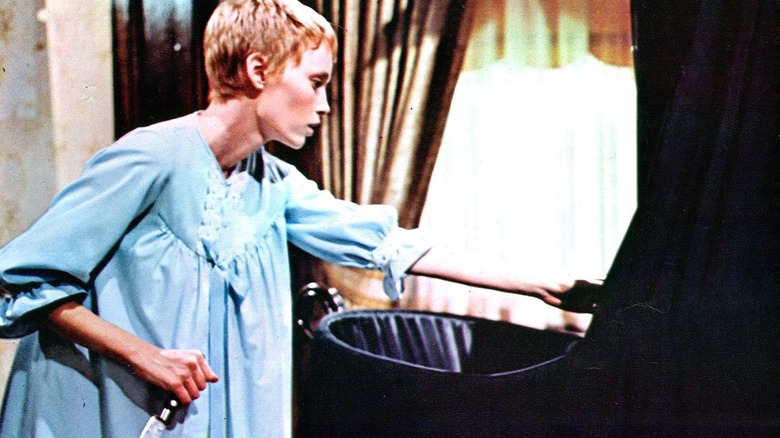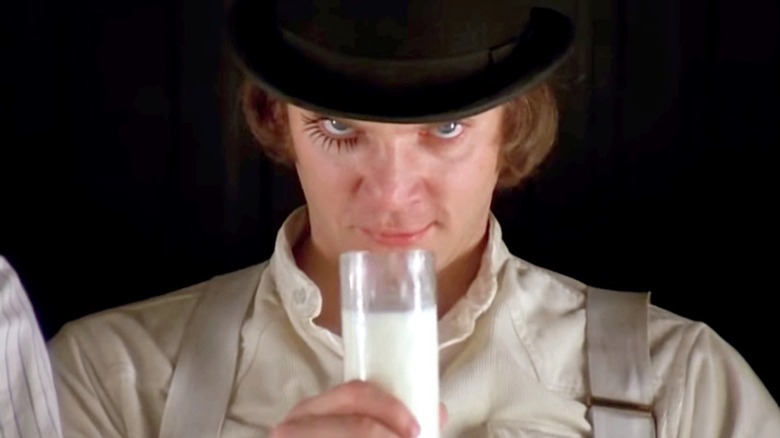These Are Wes Anderson's Favorite Horror Films Of All Time
There are some directors whose films are instantly recognizable, leaving no doubt in one's mind who was behind the camera. Wes Anderson is one such auteur, with an unmistakable style that's impossible to imitate — though some have tried. Everything from his films' color scheme to their immaculate details to their eclectic soundtrack to their idiosyncratic yet lovable characters lets you know you're watching a Wes Anderson production. His movies exist in a world just similar enough to our own to feel real, and yet fantastical enough that it feels like they could've only been dreamed into existence by him.
As a huge fan of Anderson, his movies are difficult to rank, but each one holds a special place in my heart. A personal favorite is the director's take on Roald Dahl's "Fantastic Mr. Fox," so it's exciting that Anderson will soon be revisiting the author's work with an adaptation of "The Wonderful Story of Henry Sugar and Six More," which I absolutely cannot wait to see.
Because Anderson is such a singular talent, it's interesting to consider his influences. Horror is probably the genre one would least associate with the director, so much in fact, that "Saturday Night Live" created a hilarious fake trailer for an Anderson horror movie aptly titled "The Midnight Coterie of Sinister Intruders." Considering the two topics are rarely mentioned in the same sentence, it's particularly fascinating to see what Anderson's favorite horror films are. When talking to Rotten Tomatoes, the director named some of his favorite movies and surprisingly, two of them could be considered horror. Of course, like any true film buff, Anderson couldn't possibly choose his five favorite movies of all time, explaining "I don't know if I'll be able to stand behind them as my five favorites, they'll just be the five I manage to think up right now." So, which horror films does the auteur like best?
Rosemary's Baby
Roman Polanski's controversial 1968 horror film about a pregnant woman who suspects that her neighbors are part of a satanic cult intent on stealing her baby is rightfully known as a horror classic. The movie, which stars Mia Farrow and John Cassavetes as Rosemary Woodhouse and her husband, Guy, is one of Anderson's favorites. He told Rotten Tomatoes:
"One movie that I often find myself going back to is Rosemary's Baby. This has always been a big influence on me, or a source of ideas; and it's always been one of my favorites. Mia Farrow gives a great, big performance in it, and I've read the script and it's a terrific script."
Even by today's standards, "Rosemary's Baby" is considered scary. The film's mounting sense of dread and paranoia as Rosemary begins to question everything (including her husband) is something that stays with viewers long after the credits roll. Ruth Gordon is downright terrifying as Minnie Castevet — there's a reason she won an Oscar for the performance — and you might need to watch "Harold and Maude" (another classic Gordon role) afterward just to calm down.
"Rosemary's Baby" likely isn't the first influence that would come to mind when you think of Anderson, but it does make a strange kind of sense. Polanski's film does have rather striking visuals, and I could see that influencing Anderson's trademark aesthetic. Anderson also told BAFTA (via IndieWire), "The way I think about shooting scenes and staging scenes is influenced by Roman Polanski. It's very particular." Interestingly, "Rosemary's Baby" has another famous fan in Stanley Kubrick, the director of Anderson's other favorite horror film.
A Clockwork Orange
While not a horror film in the strictest sense of the word, Stanley Kubrick's 1971 masterpiece does have enough monstrous elements to qualify. Starring Malcolm McDowell, "A Clockwork Orange" follows the journey of Alex (McDowell), as he goes from wreaking havoc with his "droogs" to undergoing a rather grotesque form of state-sponsored rehabilitation. Also a controversial film, this is another one of Anderson's favorites. The director explained to Rotten Tomatoes:
"I think A Clockwork Orange is one that springs to mind. A fully-formed Stanley Kubrick. It's a movie that's very particularly designed and, you know, conjures up this world that you've never seen quite this way in a movie before, but at the same time there's a great sort of spontaneity to it, and a tremendous energy."
Based on the 1962 novel of the same name, Kubrick famously left the final chapter out of his adaptation, thus changing the work's central message. Either way, both the book and the film pose important questions about free will that still continue to resonate with audiences. The film is difficult to watch and yet remains impossible to look away from, even all these years after its release.
It is perhaps easier to see the impact of "A Clockwork Orange" on Anderson's work. Both he and Kubrick had a style distinctly their own, and the way Anderson speaks about the film is the way a viewer could describe Anderson's own movies. Both "Rosemary's Baby" and "A Clockwork Orange" undeniably influenced generations of auteurs, but I might not really have considered these directors side by side with Anderson previously, as their styles of filmmaking seem so different. However, now that I know, I'm surprised I never thought about it before.


